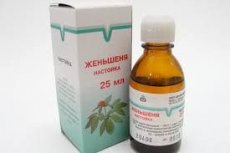Medical expert of the article
New publications
Preparations
Ginseng tincture
Last reviewed: 03.07.2025

All iLive content is medically reviewed or fact checked to ensure as much factual accuracy as possible.
We have strict sourcing guidelines and only link to reputable media sites, academic research institutions and, whenever possible, medically peer reviewed studies. Note that the numbers in parentheses ([1], [2], etc.) are clickable links to these studies.
If you feel that any of our content is inaccurate, out-of-date, or otherwise questionable, please select it and press Ctrl + Enter.

What is ginseng tincture? It is a natural medicine obtained by extracting active biological substances from ginseng root raw materials.
We present to your attention instructions for the medical use of ginseng tincture.
 [ 1 ]
[ 1 ]
Indications ginseng tinctures
The drug is recommended for use in the following conditions:
- weakening of mental and physical activity, chronic fatigue syndrome, loss of vitality;
- asthenia, increased fatigue;
- convalescent period after complex infectious conditions or surgical interventions;
- deterioration of libido of neurological etiology (combination treatment).
 [ 2 ]
[ 2 ]
Release form
The drug is produced as a transparent liquid of straw-yellow or brownish hue, having a peculiar aroma. Long-term storage may affect the precipitation of sediment in the drug, which is not a negative sign: such a drug should be used after shaking it first.
Active ingredient: tincture of ginseng plant rhizomes (1:10 ratio with 70% ethyl alcohol), 50 or 100 ml bottles.
 [ 3 ]
[ 3 ]
Pharmacodynamics
The drug is classified as a tonic (ATC code A13A).
It has an adaptogenic, tonic effect on the body, increases blood pressure. It is able to enhance excitation reactions in the nerve cells of the cortex and brain stem, and also facilitates the reflex response, stimulates metabolic processes, and increases productive activity.
The effectiveness of the drug is highly dependent on the dosage: small doses of the tincture increase the degree of excitation and weaken the inhibitory reaction, while large doses have the opposite effect.
Dosing and administration
The drug is taken orally half an hour before meals. A single dose for an adult should be 15-20 drops. Ginseng tincture should be taken up to 3 times a day for a month. The course can be repeated after a break of 14-20 days.
Children over 12 years of age can use the tincture, calculating the dosage as follows: 1 drop for each year lived.
It is not recommended to use the tincture in the evening, especially before bed, as this can disrupt the process of falling asleep.
The seasonality of the drug’s effectiveness has been revealed: the greatest effect is observed in autumn and winter.
Use ginseng tinctures during pregnancy
Experts do not recommend using ginseng tincture during pregnancy and lactation.
Contraindications
The following conditions may serve as contraindications:
- tendency to allergic reactions;
- high blood pressure;
- irritability, sleep disorders;
- tendency to increased bleeding;
- acute period of infectious pathology;
- epileptic seizures;
- children under 12 years of age.
 [ 10 ]
[ 10 ]
Overdose
Signs of overdose:
- headache, dizziness;
- sleep disorders;
- dyspeptic disorders;
- hyperthermia;
- hemorrhages;
- loss of consciousness.
Treatment for overdose is based on the symptoms that develop. There is no specific antidote.
Storage conditions
It is recommended to store the drug in a dark place, preferably in the refrigerator. The optimal storage temperature is from +8 to +15°C. Children's access to medicines should be limited.
 [ 20 ]
[ 20 ]
Shelf life
The shelf life of ginseng tincture is up to 3 years.
 [ 21 ]
[ 21 ]
Attention!
To simplify the perception of information, this instruction for use of the drug "Ginseng tincture" translated and presented in a special form on the basis of the official instructions for medical use of the drug. Before use read the annotation that came directly to medicines.
Description provided for informational purposes and is not a guide to self-healing. The need for this drug, the purpose of the treatment regimen, methods and dose of the drug is determined solely by the attending physician. Self-medication is dangerous for your health.

